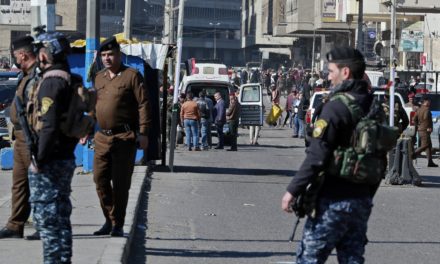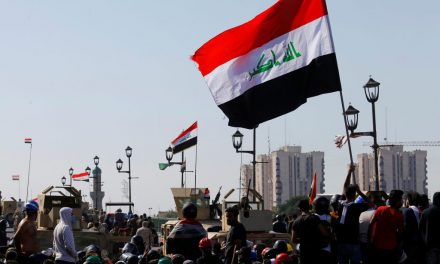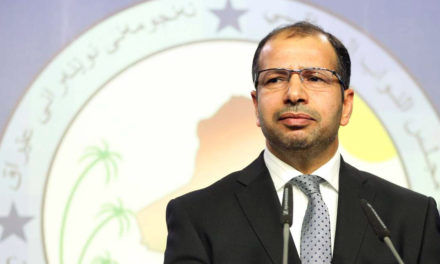(Muqtada al-Sadr attends to cast his vote at a polling station during the parliamentary election in Najaf, Iraq. Reuters/Alaa al-Marjani)
On June 13, a new development occurred in Iraq. The Iraqi Shia cleric and the official patron of Sairoon alliance, Muqtada al-Sadr, announced his partnership with Hadi al-Amiri, the head of the Fateh alliance, which contains the popular mobilization forces that were supported by Iran. For this, Kayhan, an Iranian newspaper said: ” this is an anti-American coalition”. The other Iranian newspapers identified this political coalition as a ” blow to the Saudi ambitions in Iraq”. Thus, many experts around the world are deeply thinking about this step and its expected results.
Some sources confirmed that the other Shia parties (such as those led by Haider al-Abadi, Nouri al-Maliki, and Ammar al-Hakim) would join this coalition after the end of Eid al-Fitr. As expected, this will lead to creating the largest political block that will have the ability to form the next Iraqi government. Sairoon and Fateh gained 101 seats in the new parliament, according to the results of the election held on May 12. If we add the other Shia seats, the outcome will be more than 180 out of 329 seats.
It seems that Iran wants to apply the American model adopted in the Kurdistan Region of Iraq to its allies in Baghdad. This will result in repeating the same political landscape that controlled Iraqi politics in previous years. Therefore, sect-based alliances will be the political icons of this period as well.
In fact, this contradicts with the structure of slogans the Shia parties used during their electoral campaign. Al-Sadr’s political alliance Sairoon, for example, hugely relied on the populist protest movement that was taking place in the country to reach power. The poor in urban areas were enthusiastic towards Muqtada al-Sadr’s discourse in which he asserted on these convictions: combating corruption, restricting the Iranian role in Iraq, reconciling with the Arab region, creating a cross-sectarian government, supporting the role of technocrats in institutions and developing essential services that the country lacks.
Some foreign experts had thought that Iraq would witness a new political system to reflect the rise of populism in Iraqi cities. In fact, they were not completely wrong in their assessment of the situation in Iraq. Populism will remain as the equation that Sairoon will depend on for years to come. It is the most vital source of Sairoon’s power in the political and social sphere. Hence, it is expected they will struggle for enhancing this tide by all means available to them.
In Baghdad, the Iranians have found that they must support Fateh alliance and must work on neutralizing Muqtada al-Sadr. This is the only path they can pass through to maintain their interests. As such, they could be re-creating the Shia coalition in a strong way. For this, Iranian officials informed Shia political figures that if they want to avert the repeating of Mosul’s fall in the hands of ISIS, they must forget their own differences and work in a united political frame. The Iranians think that this can become an effective strategy to sustain the Shia ruling in Iraq.
Geopolitically, we can say that both Iran and the U.S. have participated in preventing the generating of a non-sectarian parliament in Iraq. Consequently, we, as Iraqis, fear that these powers will use all their efforts to support their interests at the expense of Iraqi priorities. Under this scenario, innocent people will continue to suffer, and no one will care about their needs or their aspirations.
What must al-Sadr do to manage this dilemma? This is the basic question he and his advisers must think about. He must take into account that the Iraqi community is still fearful and remember the years in which al-Sadr’s army (Jaysh al- Mahdi) controlled Iraqi cities. At that time, they forced people to follow an extreme model of life that was not welcomed in the metropolitan cities, such as Baghdad and Basra. These forces killed secular, liberal, and well-educated people who did not agree with those radical norms. People in Baghdad still recall the hooded individuals who were spreading horror in their important city. They still talk about the military activities that those forces conducted against others, such as the forced displacement of Sunni families from Shia districts. Baghdadi citizens are still afraid of the potential resumption of arbitrary assassinations in their city.
How to deal with American presence and interests, how to minimize American and Saudi fears towards Iranian interference in Iraqi issues, and how to convince the Sunni component to integrate into this new political process are other looming complexities.
In sum, If al-Sadr failed in solving or managing these challenges, which his electoral alliance is now facing in its path to power, this might lead to fragmenting Iraq into several pieces.

Diyari Salih
Diyari Salih is an Iraqi academic with a PhD in Political Geography, Baghdad and a Post-Doctorate in International Relations, Warsaw, focusing on geopolitical issues in Iraq.










